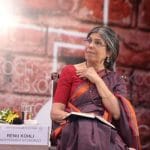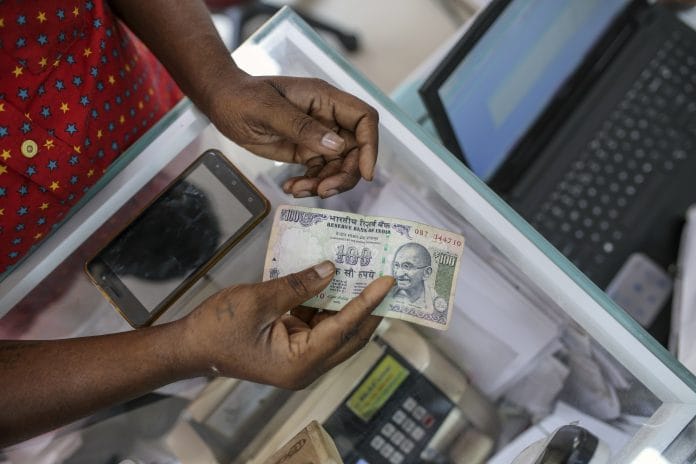The importance of campus
Satish Deshpande | Sociology professor, Delhi University
The Indian Express
While accepting that online education is now taking over traditional means of teaching due to the pandemic, Deshpande warns that it must not be a permanent replacement. “Online education must supplement, not replace, physical sites of learning,” he says, stating that it is the social and not physical space that makes traditional educational institutions (TIE) important. It acts as a leveller where students from all “genders, classes, castes, and communities can meet without one group being forced to bow to others.” While he acknowledges the advantages of online education, Deshpande also points out its drawbacks, such as lack of uniformly good internet access and familiarity across India. He warns, “OE could be the proactive trojan horse smuggled in under pandemic conditions to abrogate the state’s commitments in public education.”

HIV lessons for Covid-19
Vivek Divan | Head, Centre for Health Equity, Law & Policy at ILS Pune
The Indian Express
Harking back to India’s response to the HIV outbreak, Divan notes that it is the marginalised and vulnerable who should be at the forefront of India’s strategy, which must make these communities allies instead of subjects to be governed. “In the context of COVID-19, it means centering frontline personnel such as healthcare workers, sanitation workers, and the police, people with co-morbidities, senior citizens, and those whose lives are turned chaotic by harsh measures such as lockdowns — daily wage and migrant labourers, women and the urban poor.” he argues. HIV was thwarted in India because of “empowered community of affected citizens who demanded their health and related rights, and a place at the table as responsible solvers of the challenge, not docile recipients of directives”, not a top-down approach.

The heavy burden of social suffering
Rajeev Bhargava | Professor, CSDS, Delhi
The Hindu
Referring to the Buddhist idea that human life necessarily involves suffering, Bhargava explores other ideas of suffering, notably those caused by humans. He uses the suffering that Asoka took responsibility for during the Kalinga war, and of the ideas of suffering explored in the Mahabharat to argue that the crisis of labourers walking home is not caused by the infection or the decision to impose a lockdown, but by how the lockdown has been handled. Bhargava argues, “The misery the pandemic has caused to the poor points to the horrendous ways in which societies are organised.” He also calls out the moral indifference with which the privileged have reacted to this humanitarian crisis, calling it “integral to our chosen, self-indulgent lifestyle.”

Needed: A fellowship of countries to fight Covid-19
RV Anuradha | Partner at Clarus Law Associates, New Delhi
Hindustan Times
Comparing JRR Tolkien’s story The Lord of the Rings, and the idea of the Fellowship of the Ring to our current scenario, the author says that while the Covid-19 pandemic binds all of humanity together, countries are becoming increasingly protectionist, and globalisation is in decline. She argues that it is important to “Find a way to incentivise innovators developing medicines and vaccines, yet ensure access to the innovation is for all.” The need is to strike the perfect balance between profit and public good. “Who will own, who will have access and on what terms, to the medicines and vaccines that are being developed — this lies at the heart of any real and effective solution to tackle Covid-19,” she writes.

Reforms in a Covid era: World trade will rise again. Here’s how India can ready itself to take advantage
Arvind Panagariya | Professor of Economics at Columbia University
The Times of India
Addressing the labour law reforms taking place in many states, Panagariya underscores the need for an exit strategy for these labourers into “gainful employment in industry and services”. Harking back to the black death pandemic of the 14th century, the Spanish Flu and the Great Depression of the 20th century and finally, 9/11 and the global financial crisis of the 21st century, he asserts that no crisis has been able to hold up trade for long. He, in fact, says that the economic lull provided by the Covid-19 pandemic and lockdown is the perfect time to implement “reforms that would help it maximise the benefit of reopening of export markets post-Covid-19.”

India can’t avoid land reforms anymore
KP Krishnan | Retired civil servant
Venkatesh Panchapagesan | Professor, IIM Bangalore
Business Standard
While it is vital to tackle the danger of Covid, the pandemic has also given us an opportunity to push in land reforms, the authors argue. Land is the “most preferred asset for individual and lenders in the country” and millions of returning labourers as well as struggling micro, small and medium enterprises will depend on land to survive after one of the most challenging lockdown. The state does not guarantee title and land-market transactions are also opaque. The authors expect that the “appetite among the states for such reforms would be high” as would the demand that the Centre should act first now.

The Gandhian economic model could see us through this crisis
R. Jagannathan | Editorial director, Swarajya
Mint
The author says that while Gandhi’s forte was moral thought and not economics, post-Covid economic strategy needs an ethical slant. He suggests looking at the Gandhian model of economy in the post-Covid world. He lists the core Gandhian ideals, which include “swadeshi, self-reliance at the individual and village community levels, an abhorrence of mass production and mindless industrialization, a dislike for extremes of capitalism and communism, and a reduction of mutual antagonisms between the rich and poor.” Today, digital technology has enabled Gandhi’s vision of individual and village empowerment.

An economic mess is staring in the face
Renu Kohli | Macroeconomist
Financial Express
India’s economic recovery depends on how well the coronavirus crisis is handled, writes the author. The consumption of many goods and services is likely to remain depressed and a drop in incomes and rise in unemployment will take away private consumer demand, she notes. However, despite intense growth contraction, weak investment and consumption, inflation is not likely to remain low. Kohli reasons that producers acting at low capacity, higher import tariff and labour shortages, for example could be responsible for the same, adding that the uncertainty of demand and supply is the “overriding factor”.
Being Nehruvian in these difficult times
Uday Balakrishnan | Professor, IISc-Bengaluru
Hindu Business Line
On the 56th death anniversary of Jawaharlal Nehru, the author remembers the India’s first prime minister for his “decency in public life, immense capacity to recognise and harness talent beyond boundaries, and the audacity to have a grand and rounded vision for the country.” “To be Nehruvian is to have a capacity to overcome personal prejudices and dislikes”, the author explains while giving an example of his disagreements with Sardar Vallabh Bhai Patel, his ideological differences with Sheikh Abdullah and Syama Prasad Mookerjee, as well as his nurturing of talent such as Homi Bhabha and Vikram Sarabhai. Faced with the current Covid-19 challenge, the Modi government should take a cue from the Nehruvian way, he says.







